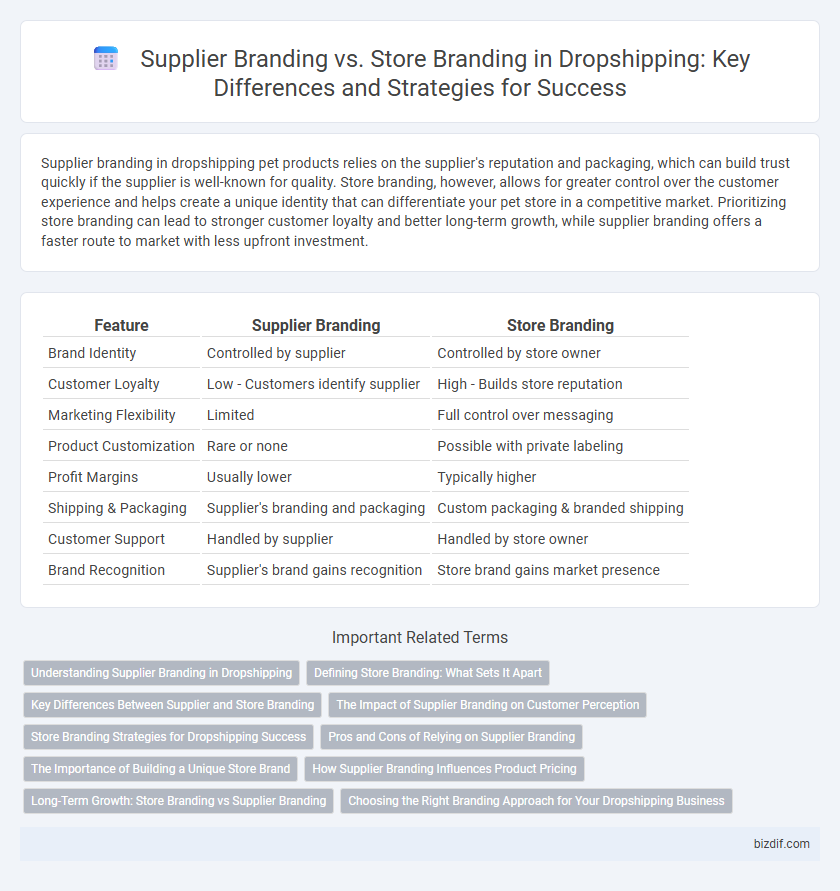Supplier branding in dropshipping pet products relies on the supplier's reputation and packaging, which can build trust quickly if the supplier is well-known for quality. Store branding, however, allows for greater control over the customer experience and helps create a unique identity that can differentiate your pet store in a competitive market. Prioritizing store branding can lead to stronger customer loyalty and better long-term growth, while supplier branding offers a faster route to market with less upfront investment.
Table of Comparison
| Feature | Supplier Branding | Store Branding |
|---|---|---|
| Brand Identity | Controlled by supplier | Controlled by store owner |
| Customer Loyalty | Low - Customers identify supplier | High - Builds store reputation |
| Marketing Flexibility | Limited | Full control over messaging |
| Product Customization | Rare or none | Possible with private labeling |
| Profit Margins | Usually lower | Typically higher |
| Shipping & Packaging | Supplier's branding and packaging | Custom packaging & branded shipping |
| Customer Support | Handled by supplier | Handled by store owner |
| Brand Recognition | Supplier's brand gains recognition | Store brand gains market presence |
Understanding Supplier Branding in Dropshipping
Supplier branding in dropshipping refers to the identity and reputation built by the product supplier, influencing customer trust and perceived value without direct control from the dropshipper. It plays a crucial role in product quality assurance and consistency, often impacting customer satisfaction and repeat purchases. Understanding supplier branding enables dropshippers to select reliable partners whose brand image aligns with their store's values, enhancing overall market competitiveness.
Defining Store Branding: What Sets It Apart
Store branding in dropshipping centers on creating a unique identity that resonates with customers through consistent visual elements, personalized customer service, and curated product selection. This approach distinguishes the business by emphasizing the store's values and voice rather than relying on the supplier's brand identity. Effective store branding boosts customer loyalty and trust by delivering a cohesive shopping experience aligned with the target market's preferences.
Key Differences Between Supplier and Store Branding
Supplier branding emphasizes the manufacturer's identity, leveraging their established reputation to build customer trust, while store branding centers on creating a unique, memorable brand experience tailored by the retailer. In dropshipping, supplier branding limits customization and differentiation opportunities, whereas store branding allows complete control over packaging, messaging, and customer engagement. Key differences include ownership of the brand narrative, control over marketing strategies, and the ability to foster long-term customer loyalty through personalized brand presence.
The Impact of Supplier Branding on Customer Perception
Supplier branding significantly influences customer perception by establishing trust and credibility before the product even reaches the store. Recognizable supplier brands can enhance perceived product quality and reduce purchase hesitation, driving higher conversion rates. This trust transfer positively impacts customer loyalty and long-term store reputation in the dropshipping model.
Store Branding Strategies for Dropshipping Success
Store branding strategies in dropshipping emphasize creating a unique customer experience through consistent visual identity, personalized packaging, and targeted marketing to differentiate from competitors. Optimizing website design, leveraging social proof with customer reviews, and utilizing social media engagement enhance brand recognition and trust. Implementing loyalty programs and offering exclusive promotions further strengthen customer retention and drive long-term dropshipping success.
Pros and Cons of Relying on Supplier Branding
Relying on supplier branding in dropshipping reduces upfront costs and simplifies inventory management by leveraging established brand trust, but it limits control over product quality and customer experience. This approach risks diminished brand differentiation, as customers associate products more with the supplier than the retailer, potentially reducing repeat business. Dependency on suppliers' reputation also exposes retailers to risks from supplier issues, such as stock shortages or negative reviews, which can impact overall store credibility.
The Importance of Building a Unique Store Brand
Building a unique store brand in dropshipping is crucial for long-term success, as it differentiates your business from competitors relying solely on generic supplier branding. A distinct brand identity increases customer loyalty, enhances perceived value, and allows for premium pricing strategies. Investing in tailored branding elements such as custom packaging, exclusive product selections, and consistent visual aesthetics creates a memorable shopping experience that drives repeat purchases and organic growth.
How Supplier Branding Influences Product Pricing
Supplier branding significantly impacts product pricing by establishing perceived value and trustworthiness before the product reaches the consumer. Strong supplier brands command premium prices due to their reputation for quality, reliability, and customer service, influencing store pricing strategies within dropshipping models. Retailers relying on supplier branding can leverage these perceptions to justify higher markups while maintaining competitive positioning.
Long-Term Growth: Store Branding vs Supplier Branding
Store branding fosters long-term growth by building customer loyalty and a unique market identity, whereas supplier branding limits businesses to the supplier's reputation and product range. Developing a strong store brand enhances customer trust, enabling better control over pricing, marketing strategies, and product differentiation. Relying solely on supplier branding risks instability due to dependency on external factors like supplier availability and quality inconsistencies.
Choosing the Right Branding Approach for Your Dropshipping Business
Selecting the right branding approach in dropshipping hinges on balancing supplier branding and store branding to enhance customer trust and loyalty. Supplier branding leverages established brand recognition, reducing marketing efforts, while store branding offers unique identity control and differentiation in a competitive market. Prioritizing store branding enables dropshippers to build proprietary value, optimize customer experience, and scale long-term profitability through personalized marketing strategies.
Supplier Branding vs Store Branding Infographic

 bizdif.com
bizdif.com